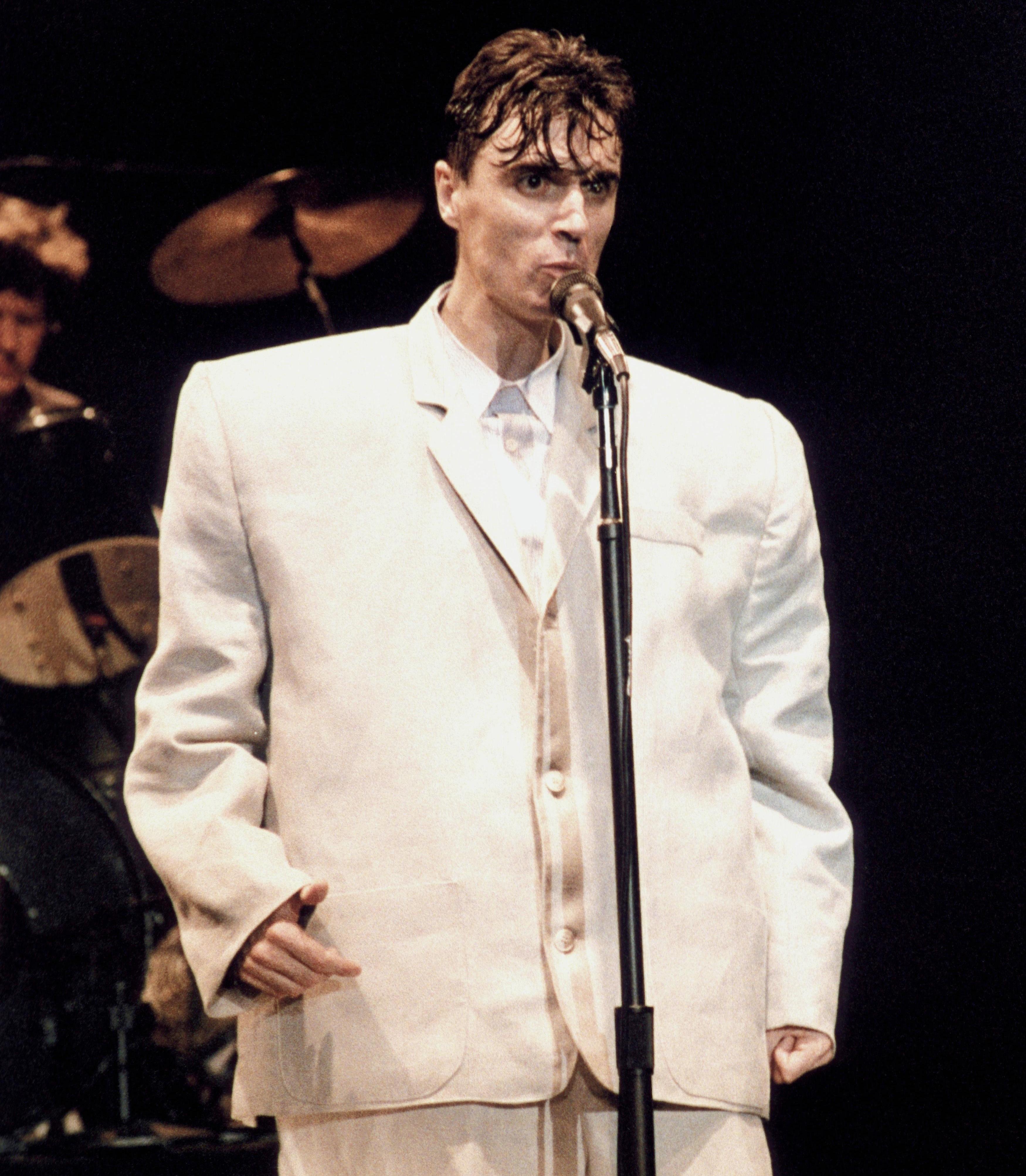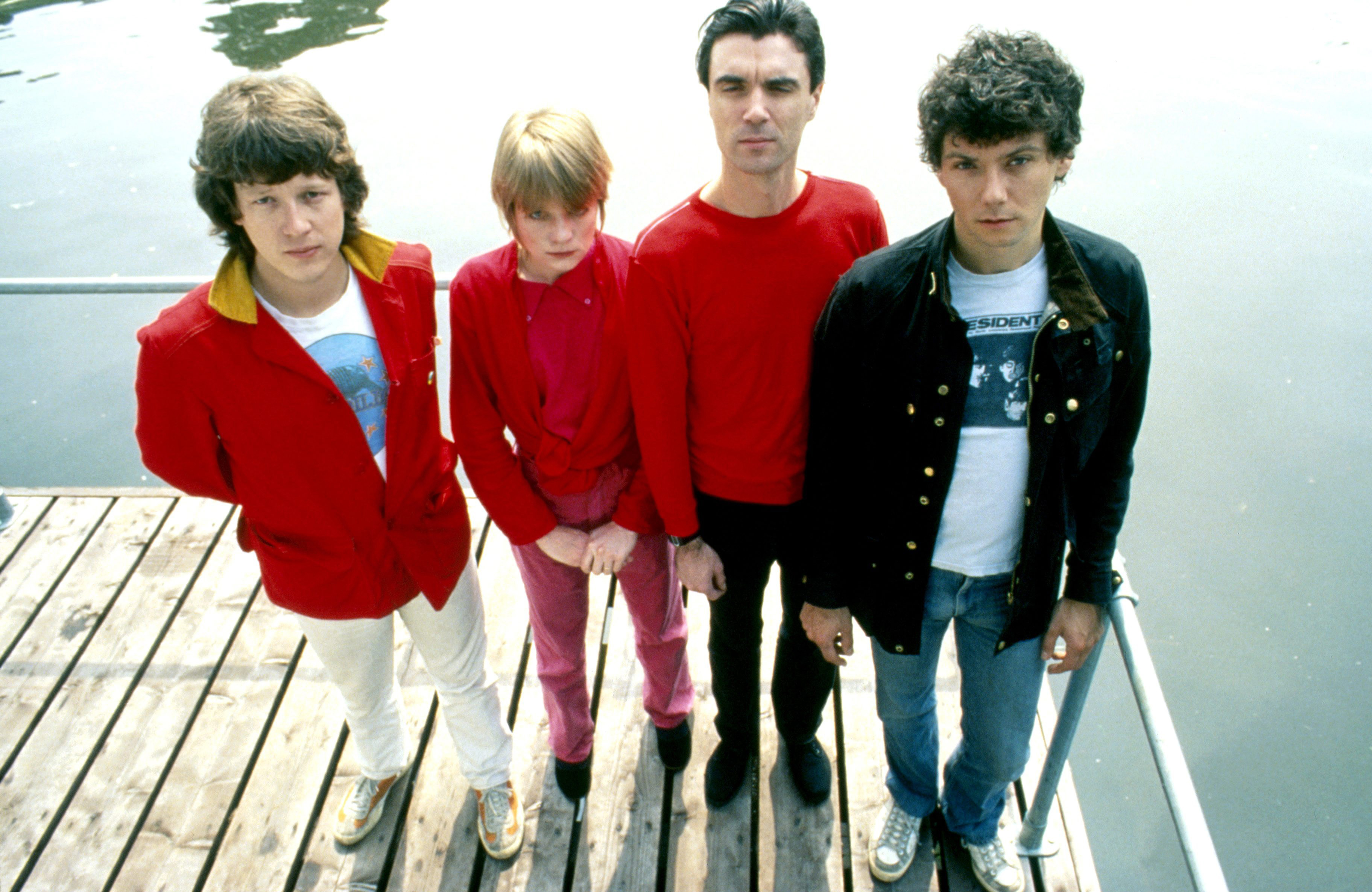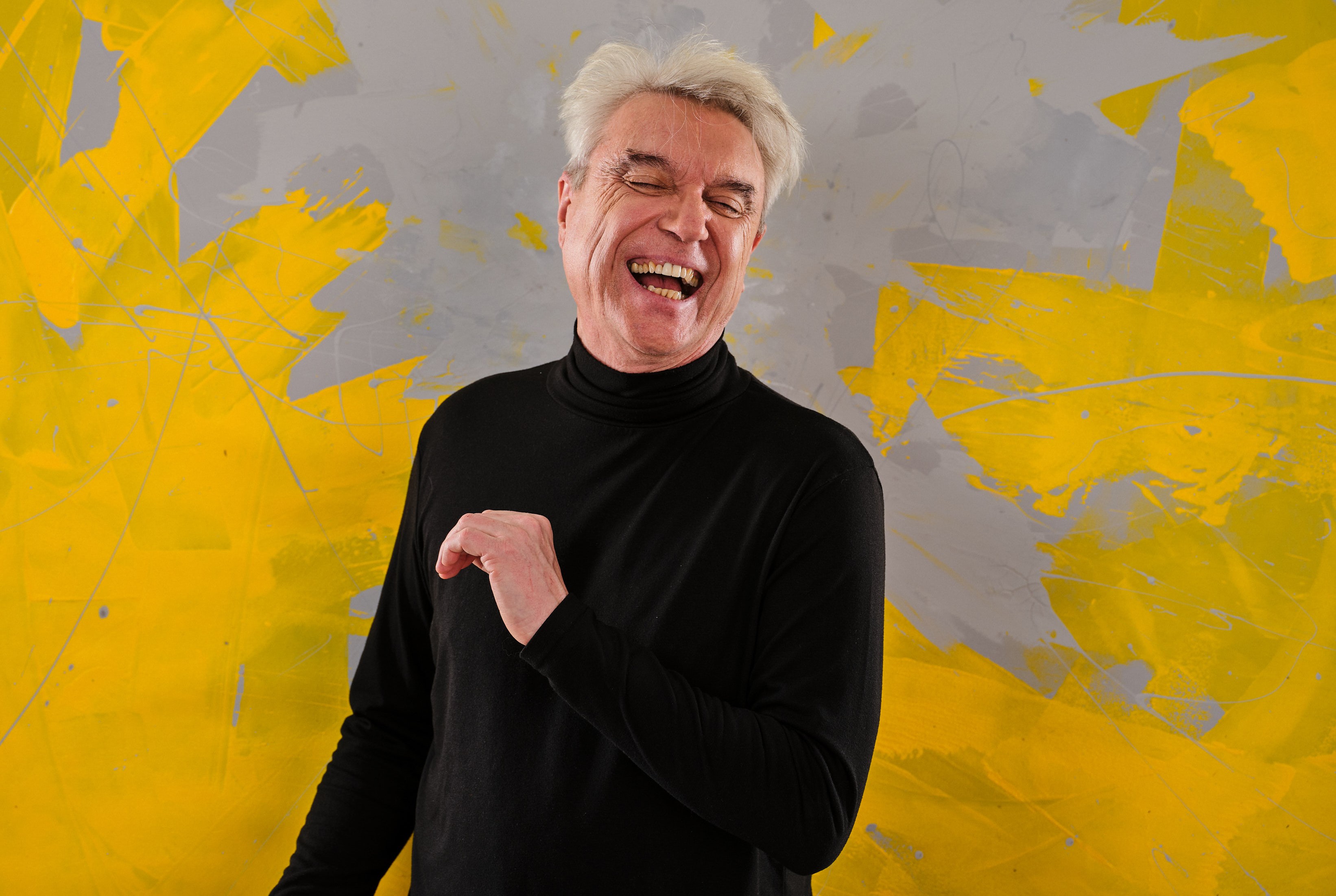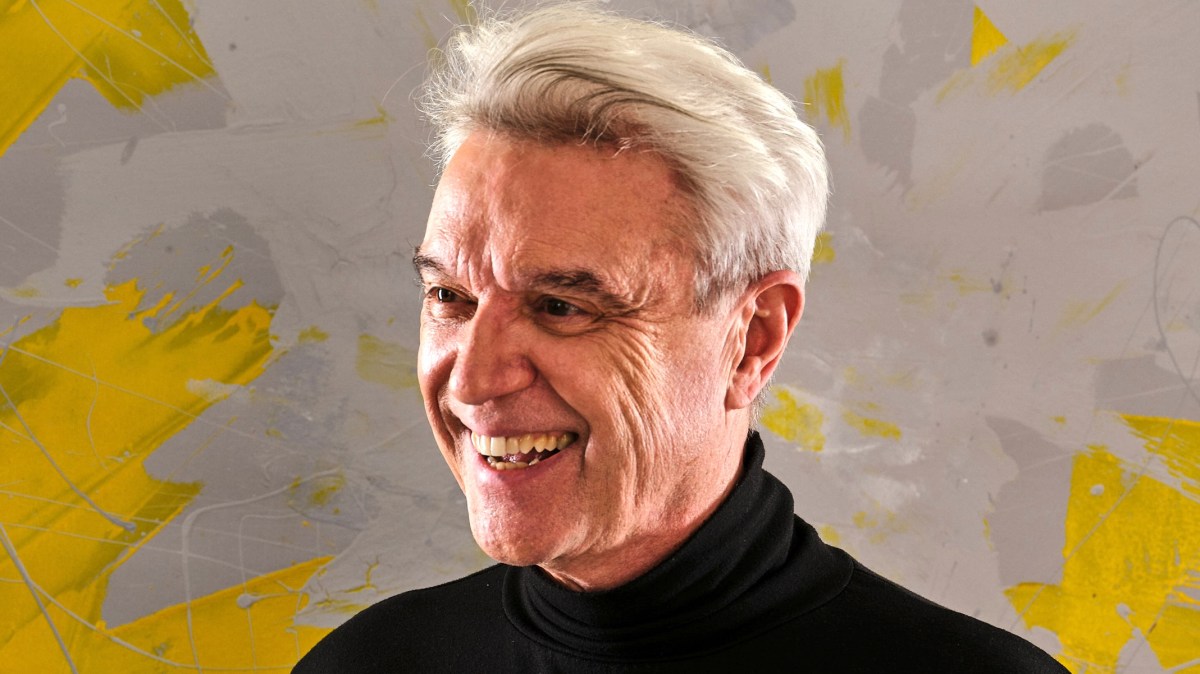In an upmarket hotel in Mayfair, David Byrne walks into the so-called Pink Room, wearing a sharp pink suit. The man is so meticulous that I imagine his suitcase to be full of different coloured suits, ready to be deployed depending on the colour of the room. His shoes are as white as his hair, and he does not so much sit as glide into his chair, kicking off an hour of conversation filled with so much joy that it becomes less Talking Heads, more Laughing Heads.
There is plenty to celebrate. First, Byrne’s groundbreaking legend of a rock, pop, funk, punk band, Talking Heads, is marking half a century — a milestone heralded by special releases including a funny new video for Psycho Killer, starring Saoirse Ronan, that somehow manages to reinvent that beloved old song.
Could this reinvigoration lead to a reconciliation for a group that split in 1991? After all, two years ago their revered concert film, Stop Making Sense, was rereleased and on chat shows it appeared as if the infamous frostiness between the bandmates — Byrne, Chris Frantz, Jerry Harrison and Tina Weymouth — might have thawed (Weymouth had previously called Byrne “Trumpian” and a “sly fox” who will “use you until he has no more use for you”).
“I recall,” Byrne, says with a wry smile when I ask if Talking Heads may play together again. “We were on TV together and people went, ‘Well, they all seem to be getting along.’” He grins, before delivering the expected hammer blow. “But no, I don’t think so. On a practical level, trying to recreate the feeling that people had when they were in their early twenties? The time that they first heard that music? That’s a fool’s errand. And besides, I’m really enjoying what I’m doing.”
Which leads to the second celebration — Byrne’s new solo album, Who Is the Sky? It is the singer’s first for seven years, since American Utopia and its subsequent raved-about tour. The new music hits like a surge of optimism, replete with humour, huge choruses and, every now and then, pithily delivered lessons from a 73-year-old who has lived about as well as anyone could aspire to.
“I’m hearing the new songs seem to be offering feelings of hope, humanity,” Byrne says. Oh, I say in surprise, showing him my notebook where I had written down “hope” and “humanity”. Bryne confesses with a grin: “I read your writing upside down! But yes, it was like therapy, given all the things happening in the world — especially in the US.”
• Why Talking Heads are back together — 30 years after their bitter break-up
Byrne’s optimism stems from his Reasons to be Cheerful project, a website and occasional variety show that seeks to buoy people up in difficult times. Its newsletter is subtitled A Weekly Dose of Dopamine for Your Inbox, and has upbeat features such as “How street art in Singapore is helping people with dementia get around”, and “We can stop glass windows from killing birds”.

Byrne in his oversized suit
ALAMY
“People need something like that,” Byrne says about his good news service. “It’s not simply to forget what’s going on, but to remind people of hope, community and humanity. Despite politics and social media, they still exist. They haven’t gone away.”
I mention a Psycho Killer lyric from Talking Heads’ debut album, Talking Heads: 77: “I hate people when they’re not polite.” Has Byrne been beating a kindness drum for most of his life? “I read recently that kindness and empathy is the new punk,” he says, laughing. “Punk used to be yelling and making a big noise, but, now, this is the resistance — kindness and empathy.”
There is an incredible openness to Byrne, no matter that he’s a legend with an Oscar, Tony and Grammy who has sold more than 40 million albums. He is a pop star with a finger on the pulse of the people, a man not only spotted cycling around his native New York, but also riding a Lime bike when in London.
• Every album by Talking Heads ranked — from worst to best
“It’s very important for me to see the world as other people do,” says Byrne, who lives in New York with his fiancée, the businesswoman and artist Mala Gaonkar, 55. He has one grown-up daughter, Malu, with his ex-wife, Adelle Lutz. “Rock stars who hide away end up creating an isolation that cuts them off from the experiences ordinary people have. That will limit their writing but, also, create a situation that might be hard to manage — this celebrity, fanaticism thing, because they are unreachable. But in New York and here as well people see me biking and go, ‘Oh, it’s just David. We see him all the time.’”
Byrne was born in Dumbarton in 1952, the elder of two children, to Tom, an engineer, and Emma. When he was two the family moved to Canada and when he was eight they settled in Maryland in the US. Before secondary school he had already learnt guitar, accordion and violin. After a couple of less successful bands, he went to New York, where he formed Talking Heads in 1975. The group won acclaim for the jagged thrust of their first album before their next three morphed into something more cinematic with the producer Brian Eno. The 1980s brought radio hits such as Burning Down the House and acclaim for their extraordinary live shows.

Talking Heads in 1977: Chris Frantz, Tina Weymouth, Byrne and Jerry Harrison
GIJSBERT HANEKROOT/REDFERNS/GETTY IMAGES
The band’s split allowed the restless Byrne to become the polymath he is now known as, America’s answer to David Bowie. He has written soundtracks and books, started a record label and a radio station; teamed up with Fatboy Slim to write an operetta about Imelda Marcos; displayed artwork, photos, sketches; designed a bike rack; and even played himself on The Simpsons.
Next year he will take Who Is the Sky? on tour. Age does not seem to have dimmed his vitality; at one point he tells me he had to go to Los Angeles “for a medical procedure” before very quickly pointing out: “But I’m fine!”
On his new album, though, I picked up hints of vulnerability and mortality — never more so than with the lyric: “One foot in the pearly gates and one foot in the flames.”
“Well, I’m certainly aware I am older,” Byrne says. “But I have consciously tried not to write about ageing or death approaching. It creeps in, but that is a well-trodden subject by songwriters.”
Isn’t the plaintive new song A Door Called No also about death? “No, its first half is about discrimination — then it’s a love song.” Is it annoying when people misinterpret your lyrics? “Well, I cannot help but think I have failed, because I wasn’t able to communicate what I thought I was.”

“I am quite a bit more socially comfortable than I was,” says Byrne
AHMED KLINK
What is the daftest interpretation of one of his songs? Byrne bursts into his most raucous cackle yet. “I mean, the stupidest was some radio stations said that they wouldn’t play Burning Down the House because they thought it was about arson!”
There is one new song that cannot be misinterpreted — Moisturizing Thing, a track that is, bear with me, about Byrne being moisturised and waking up looking like a baby. I mean, he does have fantastic skin. “Well, thank you.” So it’s a true story? “To some extent,” he says with a grin. “My fiancée will sometimes come at me with greasy hands, ready to smear my face. And at one point I thought, ‘What if I wake up and really looked younger?’” Hence the song. “But there’s a message, too. About how people judge us by the way we look. You learn a lesson you didn’t expect at the start.”
• Read more music reviews, interviews and guides on what to listen to next
Which is Byrne to a T — a fun, strange, catchy song hiding a universal truth. It is this blend that makes him both mainstream and avant-garde — but did his art school credentials ever make him afraid of writing music that may be popular? “Oh, you get that in downtown New York,” he says, sighing. “The sense that, if somebody does something that connects with the public, they have sold out, that the work must be trivial … When Talking Heads got more popular in the Eighties, there were fans from the early days who just said, ‘No — you are too popular.’ And I just thought, ‘Your loss, I guess.’”
We end on yet another project that Byrne has busied himself with recently. No, not showing up on stage with Olivia Rodrigo in New York, where the duo sung Burning Down the House. “Her songs are funny, clever, she was charming,” he says of the star. Instead, we speak about his immersive play, Theater of the Mind, which he co-wrote with Gaonkar a few years ago. Using autobiographical elements, it is a tender insight into the man and ends in a replica of his parents’ old attic as an actor reads: “You can change the story, any time. Isn’t that nice?”

Byrne on stage with Olivia Rodrigo
DUSANA RISOVIC FOR GOVERNORS BALL 2025
“That line’s just saying that our memories change, and that we’re not stuck,” Byrne says. “We’re not believing the same crazy things we believed when we were ten, or having the same prejudices we had when we were 20. We keep on changing. And it’s wonderful that our faults become kind of advantages.”
What’s changed about himself the most? “Well, I am quite a bit more socially comfortable than I was,” he says. Is that shift down to anything particularly? “I do think music really helped,” he says. “It’s a cliché, but music is cathartic. And it’s also about getting older.” He pauses before adding with the gusto of a man very much looking forward to the future: “Because you can change with time. I have friends who’ve told me, ‘David, some things that you did were ridiculous.’ I’d invite people over to my house and then go and hide.” He smiles. “I don’t do that any more.”
Are you looking forward to David Byrne’s new album? Let us know in the comments below
